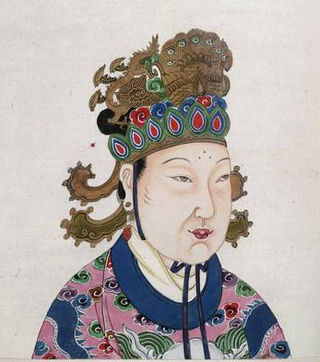
Wu Zetian, personal name Wu Zhao, was the first and only female emperor in Chinese history, and de facto ruler of the Tang dynasty from 665 to 705, ruling first through others and then in her own right. From 665 to 690, she was first empress consort of the Tang dynasty and then, after his death, empress dowager. Unprecedented in Chinese history, she subsequently founded and ruled as female emperor of the Wu Zhou dynasty of China from 690 to 705. She was the only female sovereign in the history of China widely regarded as legitimate. Under her 40-year reign, China grew larger, becoming one of the great powers of the world, its culture and economy were revitalized, and corruption in the court was reduced. She was removed from power in a coup and died a few months later.

Emperor Xuanzong of Tang, personal name Li Longji, was an emperor of the Tang dynasty of China, reigning from 712 to 756 CE. His reign of 44 years was the longest during the Tang dynasty. Through two palace coups, he seized the throne and inherited an empire still in its golden age. He was initially assisted by capable chancellors like Yao Chong, Song Jing and Zhang Yue who were already serving as government officials before Xuanzong ascended the throne. However, under Emperor Xuanzong, the empire reached its turning point and went into sharp decline and near collapse, due to numerous political missteps throughout his long reign, such as over-trusting Li Linfu, Yang Guozhong and An Lushan, with Tang's golden age ending in the An Lushan Rebellion.
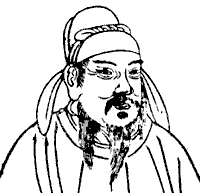
Emperor Zhongzong of Tang, personal name Li Xian, and at other times Li Zhe or Wu Xian, was the fourth and seventh emperor of the Tang dynasty of China, ruling briefly in 684 and again from 705 to 710. During the first period, he did not have actual power, which was in the hands of his mother, Empress Wu Zetian and he was overthrown on her orders after opposing his mother. During his second reign, most of the power was in the hands of his consort Empress Wei.
Princess Taiping (Chinese: 太平公主; pinyin: Tàipíng Gōngzhǔ, lit. "Princess of Great Peace", personal name unknown, possibly Li Lingyue was a royal princess and prominent political figure of the Tang dynasty and her mother Wu Zetian's Zhou dynasty. She was the youngest daughter of Wu Zetian and Emperor Gaozong and was influential during the reigns of her mother and her elder brothers Emperor Zhongzong and Emperor Ruizong, particularly during Emperor Ruizong's second reign, when for three years until her death, she was the real power behind the throne.
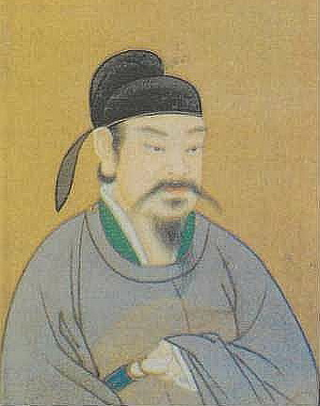
Emperor Ruizong of Tang, personal name Li Dan, also known at times during his life as Li Xulun, Li Lun, Wu Lun, and Wu Dan, was the fifth and ninth emperor of the Chinese Tang dynasty. He was the eighth son of Emperor Gaozong and the fourth son of Emperor Gaozong's second wife Empress Wu. He was wholly a figurehead during his first reign when he was controlled by his mother, and he was the titular and puppet ruler of the Tang Empire from 684 to 690. During his second reign after his mother's death, significant power and influence was exercised by his sister Princess Taiping.
Emperor Shang of Tang, also known as Emperor Shao (少帝), personal name Li Chongmao, was an emperor of the Tang dynasty of China, ruling briefly in 710.
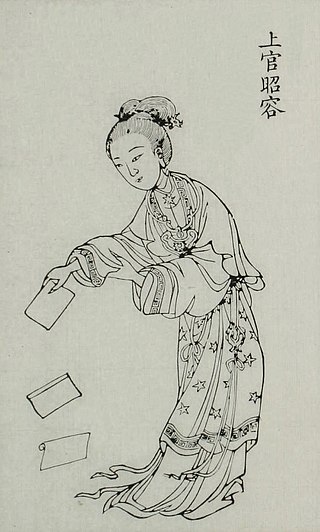
Shangguan Wan'er was a Chinese politician, poet, and imperial consort of the Wu Zhou and Tang dynasties. Described as a "female prime minister," Shangguan rose from modest origins as a palace servant to become secretary and leading advisor to Empress Wu Zetian of Zhou. Under Empress Wu, Shangguan exercised responsibility for drafting imperial edicts and earned approbation for her writing style. She retained her influence as consort to Wu's son and successor, Emperor Zhongzong of Tang, holding the imperial consort rank of Zhaorong (昭容). Shangguan was also highly esteemed for her talent as a poet. In 710, after Emperor Zhongzong's death, Shangguan was killed during a palace coup that ended the regency of Empress Dowager Wei.

Li Xian, courtesy name Mingyun, formally Crown Prince Zhanghuai, named Li De from 675 to 680, was a crown prince of the Chinese Tang Dynasty. He was the sixth son of Emperor Gaozong, and the second son of his second wife Empress Wu. He was known for writing commentaries for the Book of Later Han, the official history of the Eastern Han Dynasty. He became crown prince in 675 after his older brother Li Hong's death, but soon fell out of favor and generosity with Empress Wu herself and that's what caused his downfall. In 680, Empress Wu had her associates accuse Li Xian of treason, and he was demoted to commoner rank and exiled. In 684, after Emperor Gaozong's death, Empress Wu, then empress dowager, had her associate Qiu Shenji (丘神勣) visit Li Xian to force him to commit suicide.
Li Hong, formally Emperor Xiaojing with the temple name of Yizong (義宗), was a crown prince of the Chinese Tang Dynasty. He was the fifth son of Emperor Gaozong and the oldest son of his second wife Empress Wu, and he was made the crown prince in 656. As he grew older, he often came in conflict with his ambitious and powerful mother Empress Wu, and it is commonly believed by traditional historians that she poisoned him to death in 675. His father Emperor Gaozong, then still reigning, posthumously honored him with an imperial title.
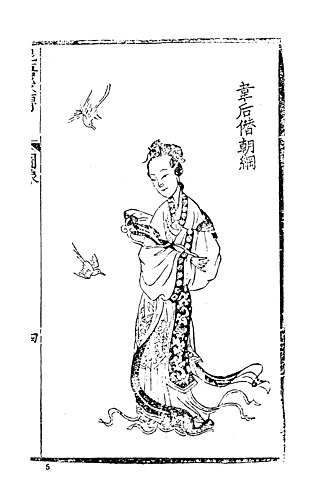
Empress Wei was an empress consort of the Chinese Tang dynasty. She was the second wife of Emperor Zhongzong, who reigned twice, and during his second reign, she tried to emulate the example of her mother-in-law Wu Zetian and seize power. She was de facto in charge of the governmental affairs during her husband's reign, though she was not formally regent. Emperor Zhongzong's death in 710 — a death traditionally believed to be a poisoning she carried out together with her daughter Li Guo'er the Princess Anle — made the empress dowager, and she took formal power as regent de jure during the minority of Emperor Shang of Tang. After a reign of seventeen days as regent, she was overthrown and killed in a coup led by Emperor Zhongzong's nephew Li Longji and Emperor Zhongzong's sister Princess Taiping.
Li Chengqi, known as Wu Chengqi during the reign of his grandmother Wu Zetian and as Li Xian after 716, formally Emperor Rang, was an imperial prince of the Tang Dynasty who served as crown prince during the first reign of his father Emperor Ruizong, who yielded that position to his younger brother Li Longji during Emperor Ruizong's second reign. Li Chengqi had a number of children, including his oldest son, Li Jin, the prince of Ruyang, who was called one of the Eight Immortals of the Wine Cup by famous poet Du Fu.
Wu Youji, posthumous name Prince Zhongjian of Ding (定忠簡王), was an imperial prince of the Wu Zhou dynasty and an official of the Tang dynasty. He is best known as the second husband of Wu Zetian's powerful daughter Princess Taiping.
Wei Anshi, formally Duke Wenzhen of Xun (郇文貞公), was an official of the Chinese Tang dynasty and Wu Zetian's Zhou dynasty, serving as a chancellor several times, during the reigns of Wu Zetian, her sons Emperor Zhongzong and Emperor Ruizong, and her grandson Emperor Shang.
Wei Sili, courtesy name Yan'gou (延構), formally Duke Xiao of Xiaoyao (逍遙孝公), was an official of the Chinese Tang dynasty and Wu Zetian's Zhou dynasty, serving as a chancellor during the reigns of Wu Zetian, her sons Emperor Zhongzong and Emperor Ruizong, and her grandson Emperor Shang.
Xiao Zhizhong was an official of the Chinese Tang dynasty and Wu Zetian's Zhou dynasty, serving as a chancellor during the reigns of Wu Zetian's sons Emperor Zhongzong and Emperor Ruizong and grandsons Emperor Shang and Emperor Xuanzong. He was known for his willingness to point out corruption in high-level officials, but was later himself implicated as a partisan of the powerful Princess Taiping and executed in 713 when Emperor Xuanzong suppressed Princess Taiping's party.
Liu Youqiu, formally Duke Wenxian of Xu (徐文獻公), was a Chinese official of the Tang dynasty and the Wu Zhou dynasty, serving as a chancellor during the reigns of the Emperor Ruizong and the Emperor Xuanzong.
Xue Ji, courtesy name Sitong (嗣通), was a Chinese calligrapher, painter, and politician of the Tang dynasty, briefly serving as chancellor during the reign of Emperor Ruizong. He was considered one of the four greatest calligraphers of early Tang, along with Yu Shinan, Ouyang Xun, and Chu Suiliang.
Empress Wang was an empress of the Chinese Tang Dynasty. Her husband was Emperor Xuanzong. She was initially made empress after he became emperor in 712, but eventually lost favor to Consort Wu, partly because she never had a son. Her brother Wang Shouyi (王守一) tried to use magic to regain favor for her, but this was discovered, causing her to be deposed and Wang Shouyi to be forced to commit suicide in 724. She died soon thereafter.
Empress Zhaocheng (昭成皇后) was the concubine of Emperor Ruizong of Tang and the mother of Emperor Xuanzong of Tang.






